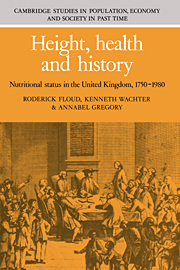Book contents
- Frontmatter
- Contents
- List of figures
- List of tables
- Preface
- 1 Height, nutritional status and the historical record
- 2 Inference from military height data
- 3 Inference from samples of military records
- 4 Long-term trends in nutritional status
- 5 Regional and occupational differentials in British heights
- 6 Height, nutritional status and the environment
- 7 Nutritional status and physical growth in Britain, 1750–1980
- 8 Conclusions
- Bibliography
- Index
8 - Conclusions
Published online by Cambridge University Press: 05 November 2011
- Frontmatter
- Contents
- List of figures
- List of tables
- Preface
- 1 Height, nutritional status and the historical record
- 2 Inference from military height data
- 3 Inference from samples of military records
- 4 Long-term trends in nutritional status
- 5 Regional and occupational differentials in British heights
- 6 Height, nutritional status and the environment
- 7 Nutritional status and physical growth in Britain, 1750–1980
- 8 Conclusions
- Bibliography
- Index
Summary
The last chapter ended on a sombre note and, indeed, the history of nutritional status in Britain is one of unfulfilled potential. Over the last two hundred years, Britain's economy and society has not enabled all its citizens to grow to their full stature, to enjoy good health or to contribute fully to the productive capacity of the nation. All too often, there have been gross inequalities; the accidents of birth have been reflected in such contrasting lives as those led by the stunted boys of the Marine Society in the slums of London or by the children of the aristocracy in the Royal Military Academy. Yet, over that last two hundred years, there has also been improvement, a reduction in the worst inequalities and an increase in the number of those whose nutritional status enables them to walk tall.
The main conclusions of this book can be simply stated. They are, first, that it is possible to write an anthropometric history of Britain and Ireland since 1750. Although many imperfections remain and although there is still much scope for argument about the detail of statistical procedures, the evidence from the records of military recruits can be used to make reasonable inferences about the height and nutritional status of the bulk of the population, the working class. More study is required, on the basis of larger samples than it has been possible to draw, of specific occupational and geographical groups, but the broad outline is clear.
- Type
- Chapter
- Information
- Height, Health and HistoryNutritional Status in the United Kingdom, 1750–1980, pp. 325 - 327Publisher: Cambridge University PressPrint publication year: 1990



